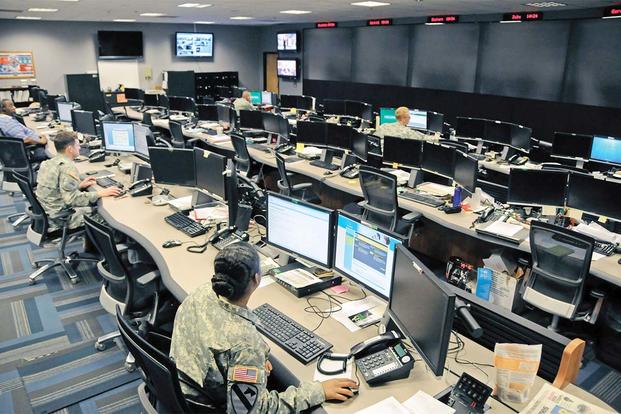In an effort to strengthen its cyberwarfare prowess, the U.S. Army is deploying teams of specially trained soldiers to launch cyberattacks on Islamic State extremists, as well as embarking on an effort to recruit cyber experts from the civilian world.
Since 2010, Army cyber experts have been standing up new commands, developing training programs and forming a cyber mission force to help combat units survive the cyber battlefield.
The Army has a requirement to field 41 teams in the cyber mission force for U.S. Cyber Command. Currently, the service has 30 fully operational teams and is scheduled to meet the requirement before the fiscal 2018 deadline, Brig. Gen. Patricia Frost, director of Army Cyber Directorate G3/5/7, told a group of defense reporters Wednesday at the Pentagon.
"We believe that it will happen by the end of 2017, which will be early," Frost said.
Army National Guard and Reserve components are also building Cyber Protection Teams, she said. The National Guard has 11; the Reserve has 10.
The Army has soldiers "in the fight today," said Brig. Gen. J.P. McGee, deputy commanding general for operations at U.S. Army Cyber Command.
"We have Army soldiers who are delivering [cyber] effects against our adversaries in ISIS or ISIL in Northern Iraq and Syria, and that is happening every single day," said McGee, referring to the Islamic State of Iraq and Syria, also known as the Islamic State of Iraq and the Levant.
"As we build these teams, we are largely building them, giving them initial operating capability and then putting them right into the fight, in contact in cyberspace."
The majority of the effort directed toward ISIS is in "offensive" operations, McGee said.
The Army's vision for cyber operations is based on an experimentation project the service has been conducting at the National Training Center at Fort Irwin, California, over the last 18 months, McGee said.
Cyber teams map out the cyber-electromagnetic terrain for a combat commander, involving infrastructure such as cell towers as wireless points, McGee said.
"If you've got a patrol that is going to be passing through maybe for a period of time, we shut down an enemy's known use of the internet at a certain point. So as a patrol is passing through, there is silence," McGee said.
They are still determining what authorities and policies can be pushed down to a commander to conduct these types of operations, he said.
In the big picture, however, cyber units spend most of their time defending the network, McGee said.
"While a lot of attention is paid to the offensive capability, because it is unique and somewhat compelling and interesting, actually the most important thing we are doing is defending our network," he said.
One way the Army is trying to identify weaknesses is by inviting industry to "hack the Army," an effort that is already showing results, McGee said.
In addition to uniformed cyber units, the Army, along with the other services, was tasked by the Defense Department to conduct the Civilian Direct Commissioning Pilot Program in January 2017.
"So much like we do with lawyers and doctors and other career fields in the Army, DoD has now asked us to do a pilot program by service that we can conduct looking at skill sets that we can bring up by direct commissioning into the cyber career field," Frost said.
Each service secretary has until 2020 to submit a report on how best to implement the pilot, said Frost, adding that it is not yet known how many civilians will be needed.
"It will be interesting to see what is the groundswell out there of individuals who work with this type of skill set who would want to come in with a direct commissioning," she said.
McGee said the effort recognizes that the civilian workforce has some unique contributions to offer.
"I think there are some indications that there is an appetite amongst industry to be able to do this," he said.
The Army is also launching a Civilian CyberSpace Effects Career Program to offer new opportunities for existing Army civilians, Frost said.
These efforts are part of the reason the Army is "going to be the lead in capabilities and operational concepts, not just for U.S. Cyber Command but for Department of Defense," Frost said.
"I think the investment in manpower, resourcing and facilities made by our Army ... I don't think any other service can match," Frost said.
-- Matthew Cox can be reached at matthew.cox@military.com.




























